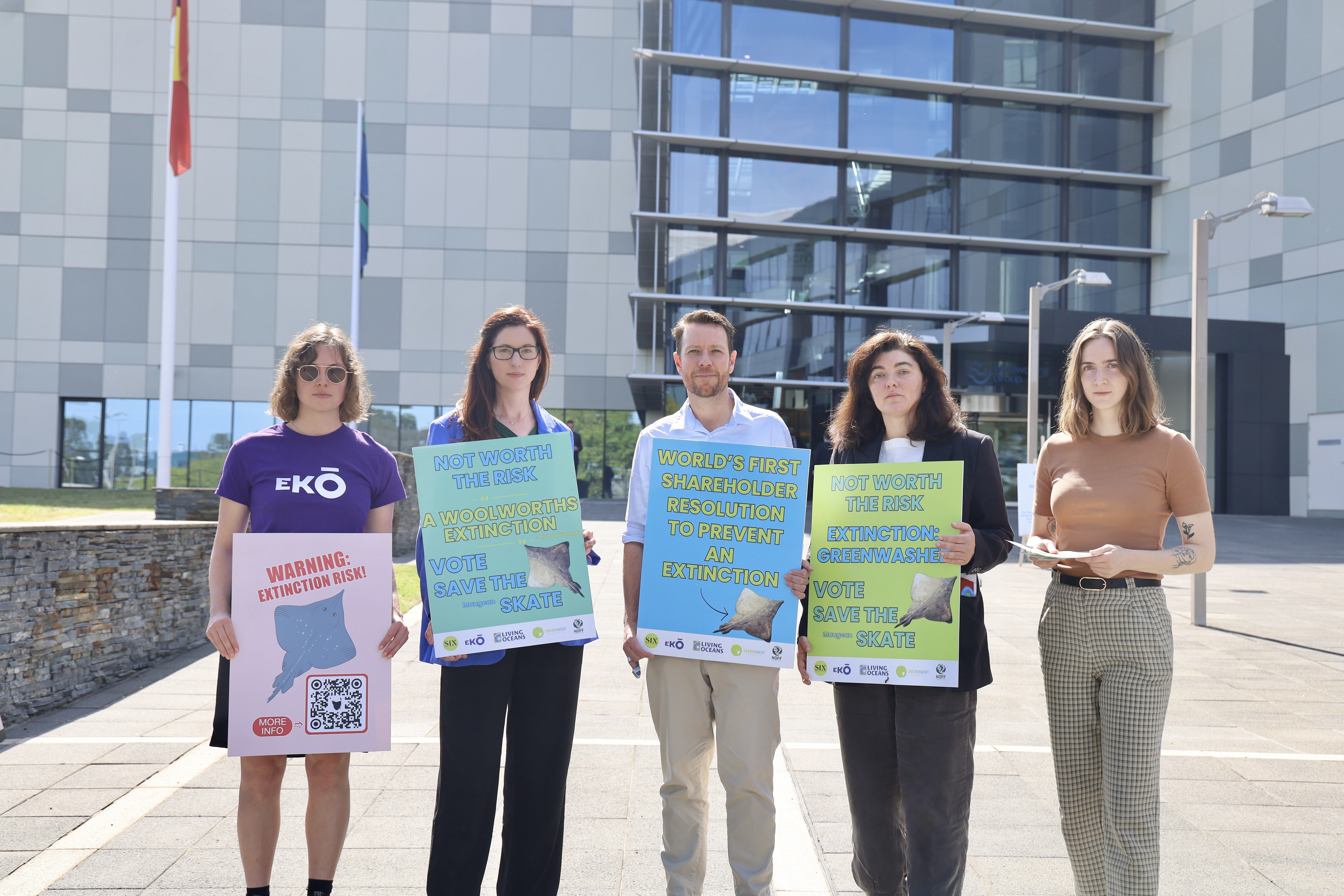- Woolworths investors will vote on a record number of shareholder resolutions at the company’s Annual General Meeting, which criticise environmental damage in their supply chains.
- The resolutions target the company’s continued sourcing of farmed salmon from Macquarie Harbour despite the threat to the endangered Maugean skate, and their recent weakening of their 2024 “no-deforestation” commitment.
- The resolutions have been co-filed by ethical share trading platform SIX alongside leading NGOs: The Wilderness Society, Environment Tasmania and Neighbours of Fish Farming.
- Representatives from Australian Marine Conservation Society, the nation’s leading charity on ocean wildlife protection, will attend to highlight the need for Woolworths to take greater responsibility for their plastic packaging.
Last year, one-third of Woolworths shareholders defied the board and voted in support of a world-first resolution aimed at ending the company’s contribution to the potential extinction of the 60-million year old Maugean skate.
It was the highest vote for a nature-based shareholder resolution in the world in 2024 and supported by many of the world’s largest pension funds representing millions of members, including Aware Super, HESTA, Norway’s Sovereign Wealth Fund, and US pension funds CalPERS and CalSTRS. This high vote was overtaken two weeks later, with 39% of shareholders supporting the same resolution at Coles. Generally, votes with support of 20% or more demonstrate clear investor sentiment on an issue and should prompt a company to take meaningful action.
Despite the high investor vote, Woolworths continues to source salmon from Tasmania's Macquarie Harbour that is the only home of the endangered Maugean skate. A third of the harbour forms the World Heritage Area with the skate listed as a species of world heritage value.
The Church of England Pensions Board has publicly urged both Woolworths and Coles to improve their seafood sourcing, citing the regulatory risks to long-term investors if the skate becomes extinct.
After another year of inaction, Woolworths is again facing escalating shareholder pressure on the skate, as well as many other nature issues. Woolworths has received another set of resolutions speaking to the company’s failures on deforestation, and will face questioning on their plastic packaging management. Woolworths is facing its first ever shareholder resolutions on deforestation, following the company weakening its 2024 commitment to only source deforestation-free products. Woolworths promised deforestation-free sourcing by the end of 2025, yet still has no plan to check its entire beef and timber supply chains for deforestation. Meanwhile, globally unique forests and bushlands, home to endangered species, continue to be destroyed for supermarket supply chains to make way for beef pastures and to turn the trees into timber pallets.
Woolworths is also the first retailer globally to receive an OECD complaint over environmental violations, filed by Environment Tasmania, over the company’s lack of action to prevent harms to the skate associated with Woolworths’ own-brand salmon.
Phoebe Rountree, Campaigns Manager at SIX, said:
“Shareholders sent Woolworths a strong message last year to take nature risk seriously. Instead the company has continued seafood sourcing practices that are harming a creature that’s been around since the time of the dinosaurs. Now the company has also weakened their commitment to eliminate deforestation. Unless Woolworths take their nature risks seriously, they risk their brand and shareholder value.
“With climate risk reporting now mandatory, investors have turned their attention to how companies manage nature risk. No company has received as many nature-based resolutions as Woolworths. The Woolworths AGM will be the biggest test of nature risks this AGM season. We hope Woolworths is ready to listen and act this year.”
Kelly Roebuck, Sustainable Seafood Campaign Director at Living Oceans Society and Vice Chair of Environment Tasmania, said:
“Woolworths continues to drag their heels at the peril of shareholders, shoppers, and the Maugean skate. In contrast, Coles has taken the steps of publicly recognising the risk salmon farming causes to the skate, reported on these impacts in their Sustainability Report, and stopped labelling Tasmanian salmon as responsibly sourced. Right now, Woolworths is the clear laggard of the two major supermarkets. Woolworths could shift from being a nature laggard to a nature leader by immediately taking actions to stop selling Macquarie Harbour salmon.”
Hannah Schuch, Queensland Campaigns Manager at the Wilderness Society, said:
“As it stands Woolworths’ deforestation-free commitment isn’t worth the paper that it’s written on. It won’t ensure the supermarket’s beef and timber supply chains are free from the destruction of Australia’s unique forests and bushlands. While Woolworths continues to look the other way as koalas and greater gliders are losing their homes, it’s a crucial time to be at the company’s AGM to raise Woolworths’ inaction on deforestation in front of its shareholders and investors.”
Tara Jones, Plastics & Packaging Program Manager from Australian Marine Conservation Society, said:
“With plastic pollution escalating, Woolworths’ slow progress on reducing disposable plastic packaging is disappointing - it’s time for real accountability and change.
“As one of Australia’s biggest retailers, Woolworths has the power and responsibility to lead on cutting plastic waste, not lag behind. Customers and shareholders deserve transparency and action.”



